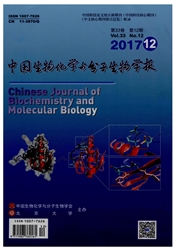

 中文摘要:
中文摘要:
探讨蛋白质酪氨酸磷酸酶α(PTPα)在血液肿瘤细胞中的特异性表达,研究过量表达PTPα对人红白血病细胞K562生物学行为的影响及在裸鼠体内致瘤能力的改变.首先应用RT-PCR和Western印迹检测3种不同类型造血系肿瘤细胞(K562、NB4、Jurkat T)中PTPα的表达水平.根据检测结果,选择K562细胞作为研究对象,利用脂质体将PTPα真核表达载体转染K562细胞,通过G418筛选获得阳性克隆,RT-PCR和Western印迹验证过表达情况;经MTT法检测细胞增值能力的改变;用流式细胞仪检测细胞周期分布和细胞分化状态;并将阳性克隆细胞皮下接种裸鼠,观察PTPα基因转染前后细胞系在裸鼠体内的致瘤能力及瘤体的组织化学变化.上述实验结果表明,通过G418压力筛选获得了PTPα高表达多克隆细胞系K562-PTPα;经体外增殖实验分析,实验组K562-PTPα细胞与未转染组细胞K562和转染空载体组细胞K562-splice相比,细胞生长速度增快,G2/M期细胞比例增加(P〈0.05),而细胞分化状态无明显变化;裸鼠体内致瘤实验显示,K562组、K562-splice组和K562-PTPα组平均瘤重分别为(1.1±0.3)g、(1.3±0.2)g和(2.5±0.5)g;病理切片显示,K562-PTPα组瘤体组织分化程度较对照组低、恶性程度高,细胞的致瘤能力增强(P〈0.01).综上所述,过表达PTPα使K562细胞具有更强的体外增殖能力和体内致瘤性,表明PTPα可能在造血系统恶性肿瘤的发生发展中发挥促进作用.
 英文摘要:
英文摘要:
To detect the cell-specific expression of protein tyrosine phosphatase α(PTPα) in hematopoietic tumor cell lines and investigate the effects of PTPα overexpression on cell growth, and tumorigenicity of human erythroleukemia cells, the expression of PTPα in three hematopoietic cell lines (K562, NB4, Jurkat T) were tested by RT-PCR and Western blotting. K562 ceils were chosen for further PTPα functional studies. The recombinant eukaryotic expression plasmid pTet-PTPα and the empty vector plasmid pTet-splice were separately introduced into K562 ceils by lipofectamine 2 000^TM , respectively, and the positive clones were screened by G418 and confirmed by RT-PCR and Western blotting. Cell growth curve of K562- PTPα was measured by MTT, whereas cell cycle and cell differentiation were analyzed by flow cytometry. Both of the growth and tumorigenicity of K562-PTPα in vivo were observed through the nude mice animal model. MTT assay indicated that K562-PTPα cells grew faster than control groups. Moreover, increased G2/M phase cells were observed in PTPα transferred cells in compared with other groups. The mean tumor size of K562-PTPα group was 2.5 (2.5 ± 0.5) g, which was significantly higher than the vector only group 1.1 ( 1.1 ± 0.2) g and wild type group 1.3 (1.3 ± 0.3) g. In summary, our results showed that PTPα overexpression in K562 cells promoted cell proliferation in vitro and increased tumorigenesis in vivo, indicating that PTPα gene may contribute to the development and progression of human hematopoietic tumors.
 同期刊论文项目
同期刊论文项目
 同项目期刊论文
同项目期刊论文
 期刊信息
期刊信息
